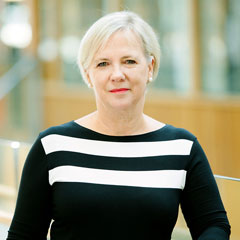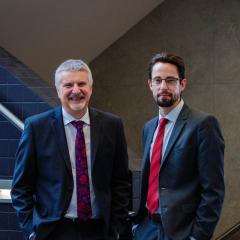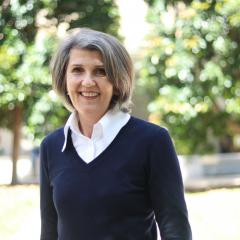 At the RECOVER Injury Research Centre, Professor Deborah Theodoros and colleagues are changing the way in which services to people with brain injury are being delivered. Professor Theodoros is a speech pathologist and the Director of the RECOVER Injury Research Centre where she leads a program of research aimed at improving the delivery and availability of evidenced-based rehabilitation services. This research focuses on telerehabilitation – the use of telecommunications and information technology to deliver rehabilitation services.
At the RECOVER Injury Research Centre, Professor Deborah Theodoros and colleagues are changing the way in which services to people with brain injury are being delivered. Professor Theodoros is a speech pathologist and the Director of the RECOVER Injury Research Centre where she leads a program of research aimed at improving the delivery and availability of evidenced-based rehabilitation services. This research focuses on telerehabilitation – the use of telecommunications and information technology to deliver rehabilitation services.
The focus on telerehabilitation at RECOVER is underpinned by over 16 years of research by myself and colleagues in the development and validation of service delivery via telecommunications.
Our team has been instrumental in spearheading research in the use of technology to assess and treat people with communication disorders in their own home.
The difficulties encountered by people who suffer a brain injury and are unable to communicate effectively are profound. Difficulties in being understood due to slurred and distorted speech, and problems with understanding what is being said and responding appropriately, lead to relationship breakdowns, social isolation, and reduced job opportunities.
Access to intensive speech therapy is crucial in their rehabilitation and this is not always possible for many people who live outside metropolitan areas. However, access to services is equally problematic for those who require assistance to attend a centre-based clinic in a metropolitan area. You could live down the street from a clinic but find it difficult to get there due to physical and transport issues.
Telerehabilitation offers an alternate service delivery method which allows the person to be treated in the comfort of their own home, in their own community.
Our research has shown that most services delivered via telerehabilitation are as good as seeing a therapist in person.
Here at RECOVER we are continuing to develop and evaluate telerehabilitation applications to deliver a variety of services to people with brain injuries so that access is no longer a barrier to rehabilitation.
Our team is engaged in telerehabilitation projects to deliver intensive speech treatment, cognitive communication training, and an outreach service to people with brain injuries and their families across Queensland.
Be Clear Online project
Dr Brooke-Mai Whelan, a post-doctoral researcher in RECOVER, is investigating the feasibility and validity of delivering an online platform called Be Clear Online, an intensive speech treatment to people with slurred and distorted speech (dysarthria) following brain injury. Using a UQ developed telerehabilitation platform called eHAB®, participants receive therapy in their own home one hour per day four days per week for four weeks.
IMPACT
(Intervention for Metacognition and Social Participation an Acquired Cognitive-communication Disorder Treatment) project
This project, led by Dr Anna Copley in the School of Health and Rehabilitation Sciences, in collaboration with Dr Louise Cahill at RECOVER, is investigating the delivery of an intensive treatment program for cognitive-communication disorders in people following brain injury. This program involves both individual and group therapy sessions which will be conducted online in the person’s home.
Community-based Rehabilitation via Telerehabilitation Project
RECOVER researchers are collaborating with the Acquired Brain Injury Outreach Service (ABIOS) in the Division of Rehabilitation within Metro South Hospital and Health service. This project is led by Professor Tamara Ownsworth at Griffith University. The project will evaluate the implementation of telerehabilitation into this outreach service to enable a wider reach of support to people with brain injury across Queensland.
Words: Deborah Theodoros



